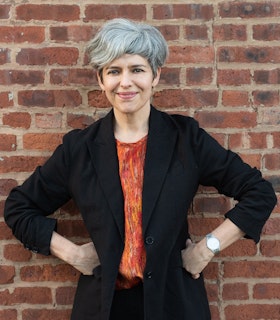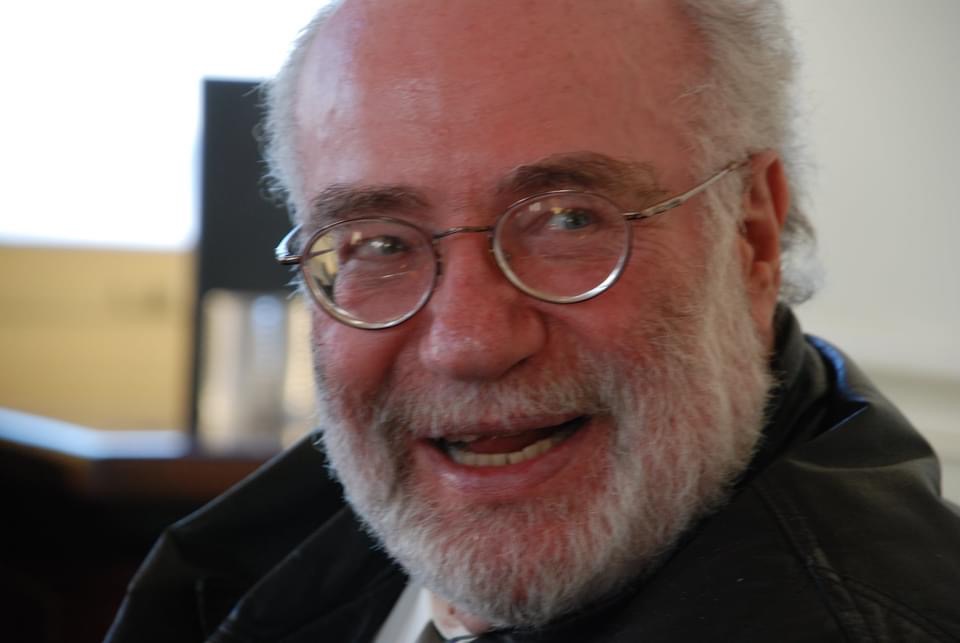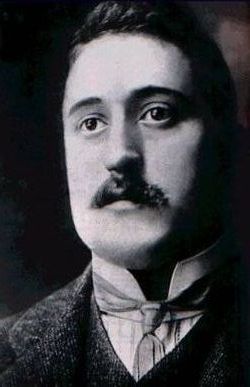PennSound Daily (original) (raw)
Congratulations to Mónica de la Torre for Two Award Wins
We send our heartiest congratulations to the formidable Mónica de la Torre for two recent major award wins.
First up there's the 2022 C.D. Wright Award for Poetry, as presented by the Foundation for Contemporary Arts. Established in 2017, the prize aims to honor "a poet over the age of 50 whose work exemplifies Wright's vibrant lyricism, seriousness, and striking originality." In an included artist statement, de la Torre describes her writing practice, noting, "My writing is guided by experimental research that prompts playful explorations of a particular subject rather than definitive interpretations. I aspire to a capaciousness that accommodates assorted modalities — lyrical, process-based, documentary, conceptual — as well as to the ability to refract my findings into imaginative poems that put generic conventions to the test." She concludes by addressing the role of time in her work: "I’m interested in revisiting the past as if it lay ahead of us horizon-like, in investigating the disjunctions and eerie doublings produced by contemplating its artifacts through the eyes of the present, and, as a result of this method, in opening up new creative paths."
de la Torre was also recently named as a 2022 Creative Capital Award winner for her most recent book, Parallel Interiors. In their citation, the foundation hails the book for "weav[ing] together research centering on the Cuban-born industrial designer Clara Porset and memories of growing up in a part of Mexico City built upon modernist utopias developed by architects such as Luis Barragán." It continues:
Exiled in Mexico City after studying with Josef and Anni Albers at Black Mountain College, Porset designed the interiors of numerous public and private buildings at the height of her career in the 1940s and ’50s. She sought to revalorize folk art and bring affordable syncretic designs to the people. De la Torre grew up in Mexico City in the 1970s and ’80s, where she was surrounded by manifestations of the ideals of modernist architects and artists, yet Porset’s work was unbeknownst to her at the time. In Parallel Interiors, de la Torre revisits her past through the eyes of the present and explores the histories embodied by rooms and objects as well as the parts of us the built environment can hold.
Those wanting to connect with de la Torre and her work can check out her PennSound author page, which is home to an array of readings, interviews, podcast episodes, and more from 2003 to the present.
Kristin Prevallet and Steven Brent, "What She Said" (2018)
Here's a fascinating performance from Kristin Prevallet to keep the week going strong: a 2017 collaboration with musician Steven Brent, titled "What She Said," which first appeared on Brent's 2018 album, Even the Failures Are Beautiful, which you can listen to in its entirety here.
In "What She Said," Prevallet presents us with a lengthy inventory of questions asked of an unnamed "she," which casts a wide net, encompassing all manner of somatic and psychological experience, and occasionally folds back on itself, before evolving into a more objective narrative in the final section. It's undergirded by Brent's subtle soundscape, which blends a foundation of menacing drones, atonal guitar chime, and orchestral gravity with periodic overlays of ticking typewriters and threshing clacks, and Prevallet's performance here is just as musical and important, wavering from sedate calm to a more fervent delivery, sometimes speaking naturalistically and other times veering into stop-start Creeley-style hesitations, which interact beautifully with the sounds around it. Click here to listen now. It will be nine and a half minutes well spent.
"E" no. 3 (2020), featuring McCaffery, Mac Low, Weiner, et al.
E was a magazine of experimental and performance writing with a particular interest in visual, concrete, and sound poetry, edited by poet/performer Marshall Reese and composer Eugene Carl. Like many upstart journals, it got off to an enthusiastic start with two issues published in 1976, with a note on the back cover of the second issue promising "next issue will be cassette or lp." Well, the editors have proven true to their word, though it took a little longer than expected, with the material initially gathered for E's third issue finally being released on red vinyl by the esteemed label Slowscan in 2020 in a limited edition of 250 copies (available via Granary Books). Reese was kind enough to contact PennSound about hosting a free digital copy of the issue and we were grateful for the opportunity, especially given how well this exciting compilation sits alongside similar works within our archives.
In his liner notes, Reese discusses the influences shaping the direction E would take, most notably his experience of the Toronto Sound Poetry Festival of 1978. He writes, "this record documents those forces and influences affecting me in the 70's, early 80's. My generation was the the forefront of an expansion of literacy combining indigenous poetries, graphics, still and moving images, recorded words, music and sound, an oral/aural culture experiencing poetry and music as synesthesia."
E no. 3 features nine tracks in total from eight artists, starting with Steve McCaffery's "Cappuccino: A Suffix Story for Henri Poincaré." Next up is CoAccident (a Baltimore-based "sound poetry music performance group" featuring Kirby Malone, Chris Mason, Ellen Carter, Alec Bernstein, Mitch Pressman, and Reese) with "When What Whole Wheat Means Meant That" and Greta Monach with two excerpts from Fonergon, before Jackson Mac Low closes out side A with "The First Sharon Belle Matla Vocabulary Gatha." Side B starts with two untitled pieces by Vladan Radovanovic, followed by Irrepressible Bastards (a.k.a. cris cheek and Lawrence Upton), followed by an excerpt from Hannah Weiner's Clairvoyant Journal (taken from her 1978 New Wilderness Audiographics cassette release), with Gene Carl wrapping up the record with "Words and Music by Gene Carl." Click here to start exploring.
Remembering David Melnick and Tom Veitch
This week we received word of the passing of two poets that unfortunately have scant holdings in the PennSound archives, but who we nevertheless wanted to mourn via their materials housed in sites affiliated with ours.
First up is poet David Melnick (1938–2022, shown at right), best known for daring books including the pioneering asemic text PCOET (1975) and homophonic translations of classical texts in Men in Aida books I and II (1983, 2002). His debut was 1972's Eclogs. All of the aforementioned books are housed at Eclipse, but also linked through Melnick's page at the Electronic Poetry Center, where you'll also find additional writings plus commentaries on and interviews with Melnick from Ron Silliman, Mark Scroggins, Gordon Faylor, and our own Charles Bernstein.
Then today came word that author Tom Veitch (1941–2022, shown at left) had passed away on February 18th. While Veitch is well known for his many successes in the world of comics, from his start in the underground comix scene to later collaborations including The Nazz and The Light and Darkness War. Veitch was also a major force behind Dark Horse Comics' titles related to the Star Wars franchise. Many of his fans might not know that Veitch was an experimental writer affiliated with the second generation New York School poets, and with early books published through mainstays of underground poetry including Coach House Press, Full Court Press, Angel Hair Books, and Big Sky books. We have a 1979 appearance by Veitch on the radio program In the American Tree that's available here and you can read Antlers in the Tree, an appropriative novel co-written with Ron Padgett in 1970 here.
We send our condolences to the friends, families, and fans of both authors.
Six Poets Each Teach One Short Poem to High-School Students
Here's a blast from the Kelly Writers House's past that's emblematic of its spirit of outreach to diverse audiences and an interesting precursor, of sorts, to ModPo. "Six Poets Each Teach One Short Poem to High-School Students," was a special event first held in May 2009 that brought together students from Liza Ewen's poetry course at Friends Central School and a half-dozen poets from the Philadelphia community, who discussed favorite poems "that would somehow convey something significant about themselves as a poet." It was such a great success that a second event was organized by Al Filreis and Ewen in May 2010.
In a blog post not long after the 2010 event, Filreis gave this rundown of the participants and their choices:
Rivka Fogel taught "This Room" by John Ashbery, a beautiful indirect memorial to Pierre Martory and non-narrative meditation on absence as presence. Sarah Dowling then came in and taught a section of "A Frame of the Book" by Erin Moure. Jessica Lowenthal then taught Harryette Mullen's "Trimmings." Randall Couch taught a very early poem by John Keats before revealing that it was Keats. John Timpane taught an Yvor Winters poem about the emotional complication of saying farewell to an adult child at an airport; Wintersean restraint and emotional distance abound here and strike one (strike me, at least) as a refreshing sort of illiberalism in an age of gobs of conventionally sentimental parent-child verse. Tom Devaney may have taken the pedagogical prize on this day, presenting William Carlos Williams' "The Last Words of My English Grandmother" — a seemingly easy poem for h.s. students to grasp. Yet it also does everything a modern poem does, and makes a remarkably good scene of instruction.
Short Films by Ted Roeder feat. Fagin, Foster, Godfrey, Patton, Szymaszek, Waldman
We've got a really exciting series of short poetry films made circa 2013 to start off this new week. They come to us courtesy of Ted Roeder, and it's possible you might have already enjoyed his two videos starring Julie Patton, which we initially announced in the fall of 2020 (but also regrettably misidentified the director as Ted Roemer). In addition to those films we've added ten new ones, which I'll detail below.
First up is a trio of films featuring Larry Fagin. In the first he speaks about writing while the second and third featuring his poetry: several new poems in the second and an excerpt from Ecology in the third. Tonya Foster (shown above) is next, reading from New Orleans Bibliography, then John Godfrey, who discusses writing in his first film and reads new work in the second. Julie Patton's two films come next, followed by [Stacy Syzmaszek](Stacy Szymaszek), who reads from Hart Island. Finally, Anne Waldman brings things to a close with three films of her reading various works. Shot in intimate settings and with glorious silvery black and white cinematography these films are as much a delight to watch as they are to listen to.
You can view all of the aforementioned films on the individual authors' pages or by clicking here for our Ted Roeder collection homepage.
PoemTalk #169: On George Quasha's "Preverbs"
As Filreis explains in his Jacket2 blog post announcing the new episode, the panelists spend some time ruminating on Quasha's particular form and its name: "At some point during the conversation our group riffs on variable senses of 'preverb': a version of proverb; a preliminary saying; language that precedes verbalization; an expression prior to or independent of action; etc." "Each line is a sentence," he continues before asking "Are there juxtapositional meanings to be derived from the sequencing of the sentences? Are the lines montaged? Are they collaged? What kind of extended, project-length seriality is this?"
You can listen to this latest program and read more about the show here. PoemTalk is a joint production of PennSound and the Poetry Foundation, aided by the generous support of Nathan and Elizabeth Leight. You can browse the full PoemTalk archives, spanning more than a decade, by clicking here.
Douglas Kearney on PennSound
Today we're highlighting our author page is for poet, performer, and librettist Douglas Kearney. The majority of the recordings you'll find there come from Kearney's fall 2018 visit to our own Kelly Writers House, which included a two-part Close Listening reading and conversation with Charles Bernstein recorded on October 22nd, along with an appearance alongside Brian Goldstein for a "City Planning Poetics" event. This sixth installment in the series, organized by Davy Knittle, was titled "Urban Revitalization" and took place the following day.
In addition to these recordings, which are available in MP3 format or streaming video, we also have video from a trio of recent readings, including a September 2017 reading at the Poetry Center at the San Francisco State University, and a pair of undated recordings from Los Angeles' Museum of Contemporary Art and Harvard University's Vocarium Reading Series. A 2005 appearance on LA-Lit rounds out the collection.
Kathy Acker, 'Redoing Childhood' (1999)
Today we're taking a dip into the PennSound archives to showcase Kathy Acker's album Redoing Childhood (Kill Rock Stars, 1999), which we first added to the site in December 2007. Here's what our original PennSound Daily announcement said about the record:
Produced by Hal Willner (William S. Burroughs, Allen Ginsberg, Lou Reed), the album features musical accompaniment by feminist punk band Tribe 8, as well as David Cunningham (keyboards), Ralph Carney (reeds), Joe Gore (guitar), Steve Bernstein (trumpet) and Kenny Wollesen (drums), who slip effortlessly between time signatures and genres, providing a roiling bed of sound which perfectly complements Acker's seething delivery. Willner originally recorded Acker's contribution in 1993 — a time in which the recurring references to President Bush were a not-yet-faded memory of a graceless political era — and though she worried about the timeliness of such allusions during the general political torpor of the Clinton era, they're eerily fitting now, a decade after her death.
Of course, our current political climate seemed practically unimaginable way back then, and Acker's strident and uncompromising perspectives are, no doubt, even more vital then than now. Hindsight also provides us with the opportunity to share these observations on the album and its origins, via Chris Kraus' After Kathy Acker: A Biography, which explains how Acker reframed large chunks of her recent book, My Mother: Demonology as "as an avant-operatic spoken-word CD":
Each take was done virtually nonstop, and Ralph Carney recalls Acker jumping up and down in the booth while Tribe 8 played. When it was finally released two years after her death, Redoing Childhood revealed a new dimension to Acker's work. "Her voice in general, there was something so lush and luscious and embracing and sexy," Ira Silverberg told the Seattle Weekly. "Kathy had rock star energy about her. [Her performance] had less to do with the punctuation of the actual sentences than with her almost reinterpreting her own work in a lyrical way … Kathy just got it."
You can listen to the complete album, along with a 1978 Segue Series reading (with selections from Blood and Guts in High School), recordings from SUNY-Buffalo in 1979 and 1995, and several recordings surrounding Acker's late novel, Pussy, King of the Pirates, including the 1995 album of the same name she recorded with the Mekons by clicking here. As always, we're grateful to Matias Viegener and the Acker estate for their permission to share these recordings with our listeners.
Guillaume Apollinaire on PennSound
We're very fond of touting our recordings by Guillaume Apollinaire, which are the earliest artifacts in our archives.
Recorded on December 24, 1913 at the laboratory of Abbé M. Rousselot, these three brief recordings offer a rare opportunity to experience the work of germinal Surrealist author Guillaume Apollinaire through his own voice. "Le Pont Mirabeau," "Marie" and "Le Voyageur," all taken from his first significant volume of poetry, 1913's Alcools, reveal both a strengthened sense of rhythm and a lyrical, elegiac tone, when presented in the original French.
Series Spotlight: LA-Lit
Today we're taking a look back at LA-Lit, a groundbreaking series running from 2005–2009, which sought to capture "the shifting nature of Los Angeles as a place," through the voices of "poets, novelists, hybridists, and non-genre text authors" living in or visiting the LA area. Hosted by Mathew Timmons and Stephanie Rioux, these programs took place at Betalevel.
Altogether there are 36 episodes, in addition to "LA-Lit: Clouds" — a two day event from 2008 that aimed to "connect the de-centered literary culture of LA in an effort to investigate its current manifestations and to develop a sense of LA's inherent literary spontaneity" — and a pair of "Poetic Service Announcements" from 2006. The roster of guests over the series' four years is also sure to get listeners excited, with appearances from Ara Shirinyan, Stan Apps, Julien Poirier, Douglas Kearney, Jen Hofer, Diane Ward, Matvei Yankelevich, Anna Moschovakis, Bruna Mori, Will Alexander, Chris Kraus, Teresa Carmody, Susan Gevirtz, Suzanne Stein, Stephanie Young, Magdalena Zurawski, Sawako Nakayasu, Mark Wallace, Vanessa Place, Maggie Nelson, Lee Ann Brown, Masha Tupitsyn, Eileen Myles, Nada Gordon, Thérèse Bachand, Dan Machlin, Lisa Samuels, Harold Abramowitz, K. Lorraine Graham, and Demosthenes Agrafiotis. Better still, each episode is in the ballpark of 80–90 minutes, allowing for lengthy exchanges with the hosts as well as extended readings from the authors' work.
LA-Lit was a mainstay of my early days at PennSound, with regular updates as new episodes were added, but for obvious reasons we haven't had much reason to mention it lately since the series ended in 2009. We're aiming to correct that today, however, since there's so much amazing material across the breadth of the series that certainly merit greater attention. You can browse through the series' archives by clicking here.








